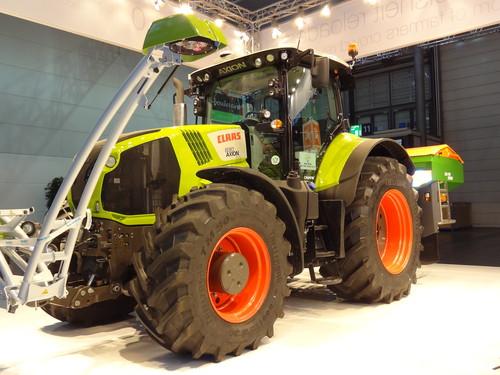
This Claas 830 Axion tractor at Cebit 2015 steers itself using GPS, and reports crop health using data gathered from infrared sensors on the boom at the front. It weighs over 7 tonnes and measures 3.2 meters high and 5.7 meters long.
Internet speeds of 50Mbps are nothing but a pipe dream for most inhabitants of Britain, while even 5Mbps would be a welcome boost for many living in remote areas.
Yet by 2018, German Chancellor Angela Merkel wants all Germans, even those in rural communities, to have access to 50Mbps broadband connections, she said at the opening ceremony of the Cebit trade show on Sunday.
This ambitious goal, if attained, could revolutionize many aspects of farming and forestry, allowing a transition from practices based on intuition and tradition to those based on big data and analytics.
And German businesses, including century-old agricultural machinery maker Claas, enterprise software specialist SAP, and a new generation of mobile app developers, are ready to take advantage of it.
Take SAP: At the of center of its booth at this sprawling trade show are a few tens of square meters of grass -- real, living grass -- standing in for the somewhat larger fields of cereal, maize or potatoes that it says it can help cultivate using its Hana cloud platform.
But how can real-time, cloud-based "field analytics" help farmers?
In SAP's demonstration, farmers can trace the outlines of their fields on existing digital mapping services such as Nokia Here, and record details of the activities, such as plowing, sowing, irrigating or fertilizing, necessary to cultivate them. SAP's prototype Digital Farming application then recommends when to start each task, taking into account the range of dates suggested by the farmer or the seed merchant, the rate of growth of the crop, soil humidity, sunlight and other data gathered from sensors in the fields.
Using live weather reports, the system can make real time recommendations to reschedule or even cancel a task. There's no point irrigating a field, for instance, if it will rain a few hours later -- but advancing the harvest of a crop might make sense in such conditions.
All these data exchanges -- especially live weather reports or satellite imagery -- could clog up the typical rural broadband connection if all the processing had to be performed on the farm. But, said SAP software development architect Matthias Aurin, SAP's system can significantly reduce the bandwidth demands: "You don't have to get all the data out of the system. We preprocess the data and just bring up the recommendations."
If farmers don't do all the work themselves, they can use the system to delegate tasks to contractors. In SAP's demo, each form for delegating tasks included a check-box indicating the farmer's agreement that data would be passed to the contractor. Germany's data protection regulations are notoriously strict, but there's more to it than that, said Aurin.
"We know the data belongs to the farmer. We let the farmer decide what is shared. it's restricted to the field and to the task." If fertilization is delegated, farmers may choose not to share the projected yield of their crop, just the amount of fertilizer to be spread per square meter.
The information exchange goes both ways: Contractors may use the system to send data back, perhaps including a map of how much fertilizer was spread where to show they had met their contractual obligations. But they don't have to transmit other information the system is capable of gathering, such as the time it took them to complete the job, or their tractor's fuel consumption, which might give their client an idea of their costs -- and thus leverage to negotiate on price, Aurin said.
SAP isn't yet ready to launch Digital Farming as a product: It's still a proof of concept, with SAP working with partners, including makers of agricultural machinery and data aggregators, to explore what kind of information it can incorporate into the system.
Aurin wouldn't name names, but Claas, another venerable German company, is already gathering much of the information that would be useful in SAP's system from sensors on its latest tractors. It had one on its stand, an 830 Axion that uses GPS to steer itself and determine how much fertilizer to apply at each stage of its route based on either a geographic database or on live data from infrared sensors used to determine crop height and health.
Product marketing manager Benedikt Wiggen didn't mention SAP, but said Claas is working with a young software company, 365FarmNet, which provides a cloud-based system for gathering and processing farm data. Barely two years old, it already has links with 15 industry partners and is spreading from its native Germany to Poland and other countries, Wiggen said.
The presence of a 7-tonne, 5.7-meter-long chunk of machinery on the show floor is a throwback to Cebit's roots in the Hanover Fair, which initially focused on heavy industry, but other areas of the show focus on more contemporary industries, including mobile app development. This year's Cebit innovation Award winner was Fovea, an app for forestry workers.
Rather than using traditional surveying techniques and cans of spray paint to identify areas of woodland to be cut -- a process that can take hours -- workers can now use the app to perform the same task in a matter of minutes, said German Federal Minister of Education and Research Johanna Wanka, awarding the prize at Sunday night's opening ceremony.
The app can help forestry workers determine which trees to cut and, using the phone's camera, calculate and immediately report the volume and value of wood they have to sell.
Assuming, that is, that they can get a network signal.
Peter Sayer covers general technology breaking news for IDG News Service, with a special interest in open source software and related European intellectual property legislation. Send comments and news tips to Peter at peter_sayer@idg.com.




